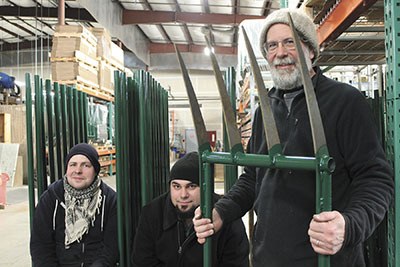By LESLIE BROWN
For The Beachcomber
A quiet revolution is taking place in a drafty warehouse on Vashon, where a handful of islanders are earning decent wages manufacturing steel farming implements. The effort defies, if not the myth of America, certainly the myth of Vashon Island — that manufacturing is dead and that nobody really makes anything anymore.
Chalk this one up to ingenuity, a bit of luck, a machine that can fabricate the product and a market for it. Plenty of people, it turns out, want what Meadow Creature manufactures — heavy-duty broadforks for hand-tilling long rows of hard-packed soil or, as the founders of Meadow Creature like to say, “artisan farming implements for modern times.”
Bob Powell founded Meadow Creature in 2009, after a handful of Vashon farmers told him they needed a decent broadfork, a tool that could replace gas-guzzling rototillers or the much more labor-intensive process of using a pick-axe and shovel. An MIT-trained engineer with an environmental ethic, Powell went to work, toiling alone in the cavernous warehouse at the Sheffield Building, using the perfect machine — a waterjet — to create the steel tines that help to make the broadfork a powerful hand tool.
Today, Powell employs four people full time, paying them family-wage salaries. He’s sold more than 3,000 broadforks, tools that have been shipped to every corner of the country. Thirteen retail outlets —including Vashon True Value — sell the item. And he’s now close to retailing his second “artisan implement” — an industrial-strength cider press, designed to be efficient, easy to use and indestructible.
Powell, 54, is a tall, bearded man with a self-effacing manner, and he calls Meadow Creature “an accidental business” that garnered more attention than he anticipated after he put up a website. “I never would have guessed,” he says of his success.
His wife, Margot Boyer, a former writing instructor who handles the company’s sales and marketing, seems not so surprised. Not only are Meadow Creature’s broadforks well-designed and well-made, she said, they “solve one of the oldest problems of civilization — how to break open the soil so it can be worked with the hands and grow seeds of the gardener or farmer’s choosing.”
“Also, they look cool,” she said.
The Sheffield’s large warehouse is a hub of activity these days. The BURN Design Lab, which makes small stoves for developing nations, is located there. The Backbone Campaign’s huge puppets hang from the rafters. And this is where the tool that has enabled Powell to put his inventor’s brain to work is located — a kitchen table-sized precision-cutting machine that uses water and abrasive sand to cut through thick pallets of steel.
“High-speed, controlled erosion,” explained Paul Thibault, Meadow Creature’s machinist. In half a day, the waterjet can carve out of steel enough tines for 18 broadforks.
The waterjet is an impressive machine — it uses software that allows Thibault to draw his design onto a screen and then push a few buttons to begin the cutting process. “I can go from an idea to a finished part in less than 30 minutes,” he said.
The beauty of it, Powell explained, is that he can fabricate low-volume products with a small overhead. As a result, Powell has built up a small machine shop in the building, taking custom orders for all sorts of things — parts to be used in sculptures, art pieces, one-of-a-kind signs. Both he and Boyer are social activists, and a philanthropic spirit infuses his shop (he’s donated $50,000 in services to BURN Design Lab).
But at the heart of this shop are the broadforks, tools that have garnered attention and won accolades from small-scale farmers across the country. “Eureka! We found it,” proclaimed the editor of Mother Earth News in the January 2012 issue. “The Vashon Broadfork, with its sharp, super-rigid, slightly curved 14- or 16-inch tines, … penetrates soil (sort of like how eagle talons work) with less operator effort than any other fork we’ve tried.”
Powell’s broadfork was already selling well in the niche market of small-scale organic farmers, but the endorsement gave the small company another boost. “The publicity was a wonderful gift,” Powell said. His then part-time employee, Jared Middle Calf, became his full-time production manager, and he soon hired three others.
Today, testimonials for the broadfork fill his website, including videos of three well-known Vashon farm families using the tool. One video features the Yarkin family, Joe and Celina and their three daughters, each with their own broadfork, doing “broadfork races” across their small family farm.
Powell hopes to now parlay the success of the broadfork into other tools and products, all manufactured with the same set of guiding principles. “We want to make only good products and do right by our customers and our employers and the earth,” he said.
Most gratifying to Boyer has been the feedback she hears from customers — comments that underscore the need to manufacture quality items. People often say to her, “Wow, you make those here? You make those yourself?” she said.
“We desperately need to bring our manufacturing sector back to life with real stuff — not junk, but well-made things that meet genuine human needs,” she added.
—Leslie Brown is a communications specialist at the county’s Department of Public Defense and the former editor of The Beachcomber.



